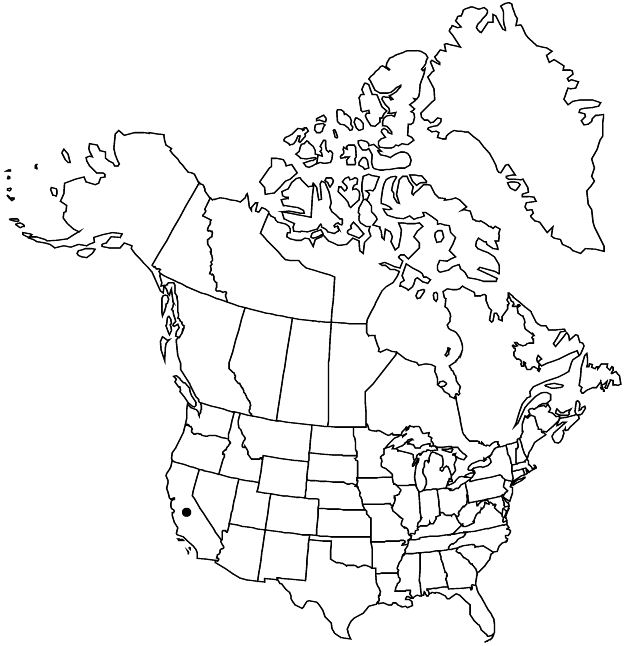Difference between revisions of "Potentilla multijuga"
Index Seminum (Hamburg) 1849: 6. 1849.
FNA>Volume Importer |
imported>Volume Importer |
||
| (3 intermediate revisions by 2 users not shown) | |||
| Line 32: | Line 32: | ||
|distribution=Calif. | |distribution=Calif. | ||
|discussion=<p>Of conservation concern.</p><!-- | |discussion=<p>Of conservation concern.</p><!-- | ||
| − | --><p><i>Potentilla multijuga</i> is known only from a handful of collections made in the 1890s near the current site of Los Angeles International Airport. All efforts to locate extant plants have failed; the species is presumed extinct. Continued use of <i>P. multijuga</i> for this species required conservation of the name with a conserved type, because the type designated by Lehmann is a specimen of <i>Horkelia cuneata</i> Lindley < | + | --><p><i>Potentilla multijuga</i> is known only from a handful of collections made in the 1890s near the current site of Los Angeles International Airport. All efforts to locate extant plants have failed; the species is presumed extinct. Continued use of <i>P. multijuga</i> for this species required conservation of the name with a conserved type, because the type designated by Lehmann is a specimen of <i>Horkelia cuneata</i> Lindley <i></i>var.<i> cuneata</i> (B. Ertter and J. L. Reveal 2008).</p> |
|tables= | |tables= | ||
|references= | |references= | ||
| Line 41: | Line 41: | ||
-->{{#Taxon: | -->{{#Taxon: | ||
name=Potentilla multijuga | name=Potentilla multijuga | ||
| − | |||
|authority=Lehmann | |authority=Lehmann | ||
|rank=species | |rank=species | ||
| Line 56: | Line 55: | ||
|publication year=1849 | |publication year=1849 | ||
|special status=Conservation concern;Endemic | |special status=Conservation concern;Endemic | ||
| − | |source xml=https:// | + | |source xml=https://bitbucket.org/aafc-mbb/fna-data-curation/src/2e0870ddd59836b60bcf96646a41e87ea5a5943a/coarse_grained_fna_xml/V9/V9_255.xml |
|subfamily=Rosaceae subfam. Rosoideae | |subfamily=Rosaceae subfam. Rosoideae | ||
|tribe=Rosaceae tribe Potentilleae | |tribe=Rosaceae tribe Potentilleae | ||
Latest revision as of 22:55, 5 November 2020
Plants ± rosetted; taproots ± fleshy-thickened. Stems prostrate to ascending, 2–5(–7) dm, lengths 1–2 times basal leaves. Basal leaves pinnate with distal leaflets ± confluent, 10–22 × 1.5–3.5 cm; petiole (2–)4–10 cm, straight hairs absent or sparse, appressed, 0.5–1.5 mm, stiff, cottony hairs absent, glands absent; primary lateral leaflets 3–8 per side, on distal 1/3–2/3 of leaf axis, ± separate, largest ones cuneate to obovate, 1–2.2 × 0.8–1.5 cm, distal 1/3–2/3 of margin ± evenly incised ± 1/2 to midvein, ultimate teeth 3–6, ± ovate, 2–6 × 1.5–3 mm, apical tufts absent, surfaces green, not glaucous, straight hairs sparse to nearly absent (except on margins), ± appressed, 0.5–1 mm, stiff, cottony hairs absent, glands absent or sparse. Cauline leaves 1–3. Inflorescences 3–10(–20)-flowered, very openly cymose, sometimes racemiform. Pedicels 1.5–3.5(–5) cm, ± recurved in fruit. Flowers: epicalyx bractlets ovate-elliptic, 2.5–4(–5) × 1.5–3 mm, sometimes toothed; hypanthium 4–6 mm diam.; sepals 4–6(–7) mm, apex acute, rarely acuminate; petals 4.5–10 × 4–10 mm; filaments 1.5–3(–4.5) mm, anthers 0.7–1 mm; carpels 5–10, styles 2–3 mm. Achenes 1.8–2 mm, smooth to faintly rugose, possibly carunculate.
Phenology: Flowering spring–early summer.
Habitat: Brackish coastal meadows or marshes
Elevation: 0–10 m
Discussion
Of conservation concern.
Potentilla multijuga is known only from a handful of collections made in the 1890s near the current site of Los Angeles International Airport. All efforts to locate extant plants have failed; the species is presumed extinct. Continued use of P. multijuga for this species required conservation of the name with a conserved type, because the type designated by Lehmann is a specimen of Horkelia cuneata Lindley var. cuneata (B. Ertter and J. L. Reveal 2008).
Selected References
None.
